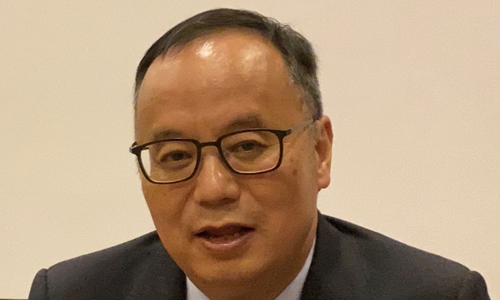HOME >> SOURCE,SPECIAL-COVERAGE
Macao to play a bigger part in China’s chip push
Source:Global Times Published: 2019/12/19 23:13:40

Song Yonghua Photo: Li Qiaoyi/GT
Editor's Note:The traditional view of Macao, the world's gaming capital, has gradually changed over the years, with science, technology and innovation becoming a growing part of the city's strength. The fact that a city as small as Macao is home to four of China's state key labs - one in the Macau University of Science and Technology and the remaining three in the University of Macau (UM) - speaks loudly for the rise of the special administrative region in the technology world. Focusing on the university's rising profile in the sphere of chip technology, Song Yonghua (Song), rector of UM, shares with the Global Times (GT) his thoughts on opportunities both for the university and the city amid a much-talked about push for regional growth.
GT: Where does Macao stand relative to other countries and regions in the world in terms of chip research? Do you think Macao can become a leader in chip technology development in China?
Song: In terms of production capability, Macao is limited due to its small population and lack of natural resources, but it does play a world-leading and unique role in research.
UM managed to develop its first microelectronic chip in 1995. Chip research has now become a main area of research at the university. The Analog and Mixed-Signal VLSI Laboratory was founded by the university in 2003, which was elevated to the status of a state key laboratory in 2011. At this year's International Solid-State Circuits Conference of the Institute of Electrical and Electronics Engineers, eight papers from the laboratory were accepted, UM tied with two other institutes for second in the world, and next only to Intel. With our cutting-edge research, we can play a greater role in China's microchip sector.
Our microelectronics research team works closely not only with mainland partners, but also with overseas institutes such as the International Iberian Nanotechnology Laboratory, jointly established by Portugal and Spain. With our strong international network, we can contribute to China's microchip sector in another way by fostering international cooperation.
In microelectronics, we seek to help the Guangdong-Hong Kong-Macao Greater Bay Area (GBA) retain the best scientists and technologists. Our professors will help our students build up their skills and knowledge, and these students can then contribute on the frontline.
GT: What kind of interactions does Macao have with the Chinese mainland in the development of science and technology? What kind of opportunities does the GBA bring for the development of science and technology industry in Macao? Will this facilitate the commercialization of research results?
Song: For many years, researchers in Macao have been working with their mainland counterparts. UM shares resources and launches joint programs with partners including Tsinghua University and Zhejiang University. We also work with mainland enterprises in various fields including microchip design. Earlier this year, we established two joint laboratories with institutes under the Chinese Academy of Sciences to study artificial intelligence and cognitive and brain science.
A further example can be found right here on Hengqin Island, where we have established a platform for the commercialization of new technologies in Chinese medicine in collaboration with a state key laboratory at Peking University and the Guangdong-Macao Traditional Chinese Medicine Science and Technology Industrial Park.
The national policy of developing the GBA gives a new impetus to our mainland partnerships. Researchers in Macao can now participate in the establishment of national scientific research platforms more effectively, and apply for cross-border research grants and research projects with greater convenience. Greater cooperation with other GBA cities will certainly benefit the commercialization of our research outcomes. This October, we inaugurated the new building of our Zhuhai UM Science and Technology Research Institute on Hengqin Island, which is our first demonstration base for industry-academia cooperation in the mainland. This is one of our major steps to explore opportunities in the GBA.
GT: What challenges does Macao face in terms of the training of professionals in technology and innovation?
Song: Due to structural constraints such as its small population and lack of a sufficiently diversified economy, Macao has yet to establish a strong talent pool of technology professionals, and its ability to commercialize its research outcomes is limited. Greater regional cooperation is required for Macao's training of technological professionals, but certain challenges remain due to institutional differences between the mainland, Hong Kong and Macao. However, I am confident that existing issues can be and will be steadily addressed with joint efforts.
Macao should pursue collaborative development that goes beyond the constraints of geographic boundaries, which will create more opportunities for Macao's technology sector, and give our graduates more career options, including good jobs and starting their own businesses with innovative ideas.
Posted in: INSIDER'S EYE,FEATURE 3